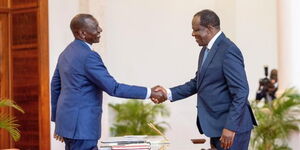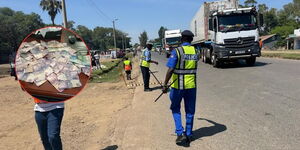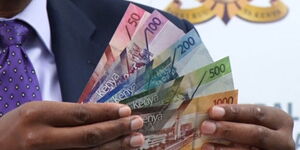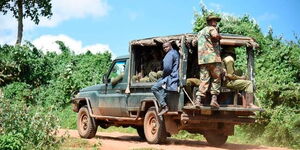On Friday, March 13, Health Cabinet Secretary Mutahi Kagwe confirmed Kenya's first Coronavirus case, and since then, cases have risen to seven, with the government launching a manhunt for several others who may have come into contact with the patients.
Following the numerous deaths and several cases of infection throughout the world, the World Health Organization declared the Covid-19 virus a worldwide pandemic.
Several countries have been forced to close their borders, declaring nationwide lockdowns as a way to combat the deadly virus.
When it first began in China, the country declared a national lockdown, impacting the world's economy. According to financial reports by the World Bank, the southern Asia nation handles 30 per cent of all container cargo in the world.
Kenya responded to the international measures, first with the High Court banning flights from affected countries on Sunday, March 15, when President Uhuru Kenyatta banned travel to foreign states, as well as incoming flights.
With bans on international travel, several sectors in the country's economy have since taken a dump.
Tourism
On Friday, March 20, Fort Jesus among several other tourist attraction sites along Kenya's coast were shut down. This being an indication of the impact the coronavirus pandemic was having on the country's tourism sector.
Patronage of beach hotels, restaurants, parks is on a steady decline, following the ban of international travel as well as a national directive to have members of the public allowed by employers to work from home.
When the pandemic hit the tourism industry, several symbiotic businesses went down the cesspool with it.
Tour guide services, clearing and forwarding services at both air and seaports, hotel and accommodation, taxi services, cultural heritage and entertainment festivals, were paralysed.
Industrials and Agriculture
When ordinary members of the public first heard of the virus, it was hard to imagine that it would fast trickle down to the general local populace.
Immediately after CS Kagwe announced Kenya's first case, people flocked retail outlets to stock for sanitizers and foodstuffs that would see them through the pandemic.
The mama mbogas in our markets and the humble proprietor running his or her own Kiosk in the remote areas of the country could not fathom the ripples touching their shores.
However, as the crisis deepens, several businesses are taking a hit. Farmers from around the country dependant on agriculture are suffering a blow, after the ban on travel.
Farmers trading in avocados, coffee, pyrethrum, tea, macadamia nuts, flowers, mangoes, among several other export crops are already feeling the pinch.
On Tuesday, March 11, videos alleged to be from the Netherlands surfaced online showing companies dumping flower imports into the ocean, due to lack of demand.
On average, agriculture is solely the largest contributor to the country's economy and with the US, Kenya's largest coffee market, and the UK, Kenya's largest tea markets all closing borders, our economy is vulnerable.
Health CS Kagwe warned of an impending lockdown, which will leave even the small-time domestic agro traders immensely affected.
A directive to work from home or closure of companies as a way to cut back on congestion or enhance social distancing is set to take a toll on industries and factories from around the country. Especially where manual labour is required.
Industries are set to experience a backlog in products as well as raw materials, as the country slows down on engagements that may expose the public to a higher risk of contracting the virus.
Companies specialising in perishable products are staring at possible losses if the situation does not normalise sooner rather than later.
Retail
In the first week of March, merchants in Kenya had started feeling the pressure of China closing, with a number of retailers issuing warnings of products that may run out.
Supermarkets and other retailers from across the country warned of shortages in electronic products, textiles and clothing, therapeutics, among several other imported goods.
Business Daily, on March 11, 2020, reported that a number of retailers had procured goods estimated to run out in the month of April.
The country has experienced a spike in the purchase of sanitizer products, stackable foods; flours and cereals. Should the government order a lockdown, however, the country will have a problem as kitchen pantries get depleted. There is also the fact that not everybody was liquid enough to stock up at the genesis of the crisis.
Sports, Media and Entertainment
Following a directive to avoid congregating in large numbers, or avoid public gatherings as a measure to curb further spread of the virus by the government, sectors dependant on crowds will be greatly affected.
Players in the entertainment industry, that is musicians, comedians, emcees, disk jockeys, hype men, will all have their daily bread sliced.
Comedian Daniel Ndambuki alias Churchill, on Sunday, on March 16, aired the most bizarre episode of his popular comedy show.
Dubbed the quarantine edition, the highly-rated comedian took to the stage at the South C's MoW Sports Club, and performed to an empty hall.
Churchill was forced to cancel the live recording of the show which was slated for Saturday, March 14, due to the government's directive on public events occasioned by the coronavirus pandemic.
A regular ticket goes for Ksh1,000, with the VIP ticket setting you back Ksh2,000. Sources revealed that the show attracts an average of 6,000 people per event. The VIP section takes up a third of the total number of people. Ignoring the complimentary tickets factor, the show rakes in an average of Ksh8 million from gate charges.
The cancellation of rallies has also had an impact. The Building Bridges Initiatives rallies, for instance, generated huge national interest, and live coverage of the events was another dime in the pocket for media houses.
Sports management bodies in the country have since cancelled all sports activities with the government further putting a halt on international participation in sporting activities.
This has resulted in revenue cutbacks for the federations, sportsmen, and media houses covering the events.
Transport
Travel outside the country has since been banned, posing a challenge to those dependant on international markets, tourists. All these resulting in significant losses by airlines.
On March 20, CS Kagwe issued a directive that would see PSVs scale down their passenger capacity by half, so as to minimise further spread of the virus.
"14-seater matatus will carry a maximum of eight passengers; 25-seater vehicles a maximum of 15 passengers, 30 seater vehicles and above to maintain a sixty per cent passenger capacity.
"In other words, there is no point in having eight people and then two people are sitting close together and leaving the other seats open," Kagwe stated.
A directive to have people work from home would mean fewer customers for Matatus, and a lockdown would mean no business for the sector.
Employers in the industry, as well as the hundreds of young Kenyans depending on the daily earnings from this job, will have nothing to do.
Banking and Finance
Banks have been asked to waive charges for transactions below Ksh 1,000 as well as reduce the tariffs on other transactions.
Central Bank of Kenya Governor Patrick Njoroge during a briefing on the impact of the Coronavirus on the Country's economy at State House Nairobi, on March 18 stated that lenders would work out repayment plans with its customers with loans due during this period.
He also has directed that to increase the use of mobile digital platforms, all banks waive fees on balance enquiries, further stating that SMEs can also have discussions with their banks on the structure of their loans.
Medium-Sized Enterprises and corporate borrowers can contact their banks for assessment and restructuring of their loans based on their respective circumstances.
During this period, lenders are staring at a reduction in business with members of the public as well as other companies dependant on them scaling down activities.
On Friday, March 13, Nairobi Stock Exchange suspended trading towards the close of the market as investors made panic sales of shares.
Total market capitalisation dropped by Ksh120 billion, one of the largest declines in a single day in the history of the bourse. The value of all stocks closed at Ksh2.04 trillion, compared to Ksh2.16 trillion on Thursday, March 12, 2020.












